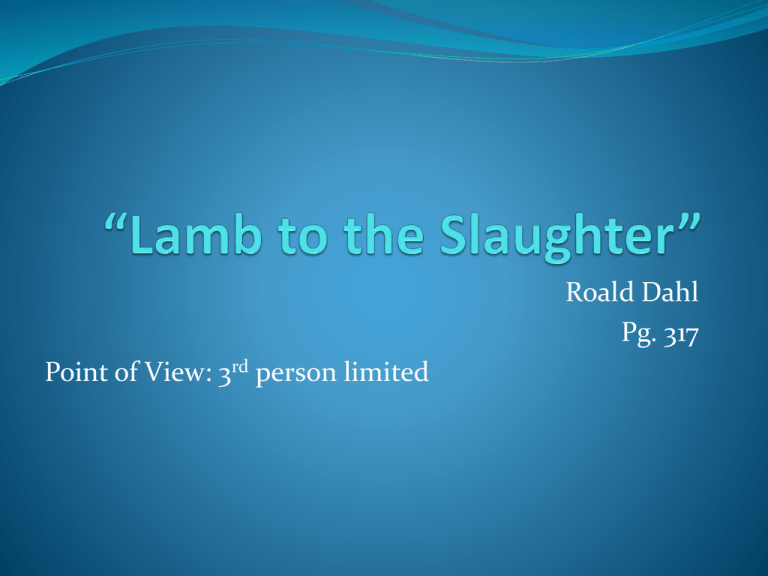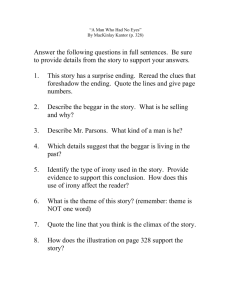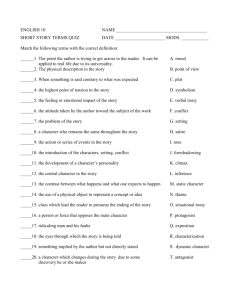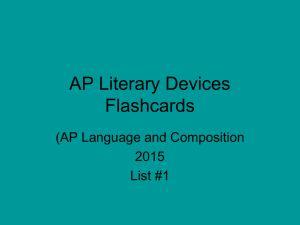Lamb to the Slaughter Activities
advertisement

Roald Dahl Pg. 317 Point of View: 3rd person limited Vocabulary for “Lamb to the Slaughter” Journal Prompts. Every day, we will be focusing on one vocabulary word that you should have already completed using Circle Maps (stored in vocab section of binder). Use ONE sheet of paper to record all of your journals. Label each journal. (Example, #1, #2, etc.). Respond to the journal prompt using constructed response format. Please follow all directions. Failure to follow the required format will receive ½ credit at most. Constructed response format: TS-Topic Sentence (restates the question and talk about the subject) CD- Concrete Detail (direct quote, paraphrased or summarized) For example…. CD-Concrete Detail (direct quote, paraphrased, or summarized). In addition,… CM- Commentary (your opinion, interpretation, insight, etc.) This means…. CS- Concluding Sentence As a result….. Journal Prompts: Journal #1: Describe a place where you feel placid. Where is it? What does it look like? Provide vivid imagery. Journal #2: Mary luxuriates in the presence of her husband. Describe someone who makes you feel warm and complete, someone you are drawn to. Example: A place where I feel placid is…For example… In addition,… This means… As a result… TS-Topic Sentence (restates the question and talk about the subject) CD- Concrete Detail (direct quote, paraphrased or summarized) For example…. CD-Concrete Detail (direct quote, paraphrased, or summarized). In addition,… CM- Commentary (your opinion, interpretation, insight, etc.) This means…. CS- Concluding Sentence As a result….. Journal Prompts: Journal #3: Mary is bewildered by her husbands strange behavior. She has no idea about the bad news she is about to receive. Describe a time when you were unsuspecting and had no idea that bad news was coming. Help us to feel your bewilderment in that moment. (4-5 sentences) Journal #4: Describe an injury you acquired where your blood congealed. Journal #5: Explain how someone could be hospitable to another person. TS-Topic Sentence (restates the question and talk about the subject) CD- Concrete Detail (direct quote, paraphrased or summarized) For example…. CD-Concrete Detail (direct quote, paraphrased, or summarized). In addition,… CM- Commentary (your opinion, interpretation, insight, etc.) This means…. CS- Concluding Sentence As a result….. While we read: On a piece of paper, draw a dialectical journal. For EACH page, use the “Summarize” close reading strategy on the handout in your “Class Info” section of your binder. Each page should have four very brief summaries (1-2 sentences) interpreting in your own words what has happened in the story. Describe the author’s purpose in one sentence for each page. (To describe Mary’s happy mood to the reader, etc.) Key words-list and define any unknown words. Example of Dialectical Journal on following slide: Dialectical Journal (Close reading): Name of strategy used from Close Reading Sheet: Summarize ____________________ Concepts used: i.e. “State what the paragraph is about…” (four summaries PER page 1-2 sentences each). Describe what the author is doing (1-2 sentences PER page). Key terms: (any words you do not know-do not leave this step blank). Page # and Paragraph #s Your Answers (commentary): Irony Dramatic irony Situational irony Definition: In a story, when the audience knows something the character does not know. Definition: When what happens is the opposite of what is expected. Example from story: Example from story: 1-2 sentences explaining how your example is dramatic irony: Another example from story: 1-2 sentences explaining how your example is dramatic irony: Do not forget to cite your concrete details! Note: You are finding two examples for each type of irony, and then explaining EACH example you provided. 1-2 sentences explaining how your example is situational irony: Another example from story: 1-2 sentences explaining how your example is situational irony: Irony Review: On the back of your tree map, number your paper from 1-6. Look at each scenario, and identify whether the scenario is situational, dramatic, or verbal irony. Include a short explanation of why the scenario is the type of irony you selected. http://www.ereadingworksheets.com/readingworksheets/irony-worksheet.pdf Grammar Mini-Lesson: Active or Passive Voice Please take out a sheet of paper and title it “Active or Passive Voice Practice.” Turn to page 327 of your textbook. Read through the differences between active and passive voice. Then, rewrite the paragraph on page 327, so that all of the verbs are in the active voice. Note: You may have to add new subjects for some sentences.




